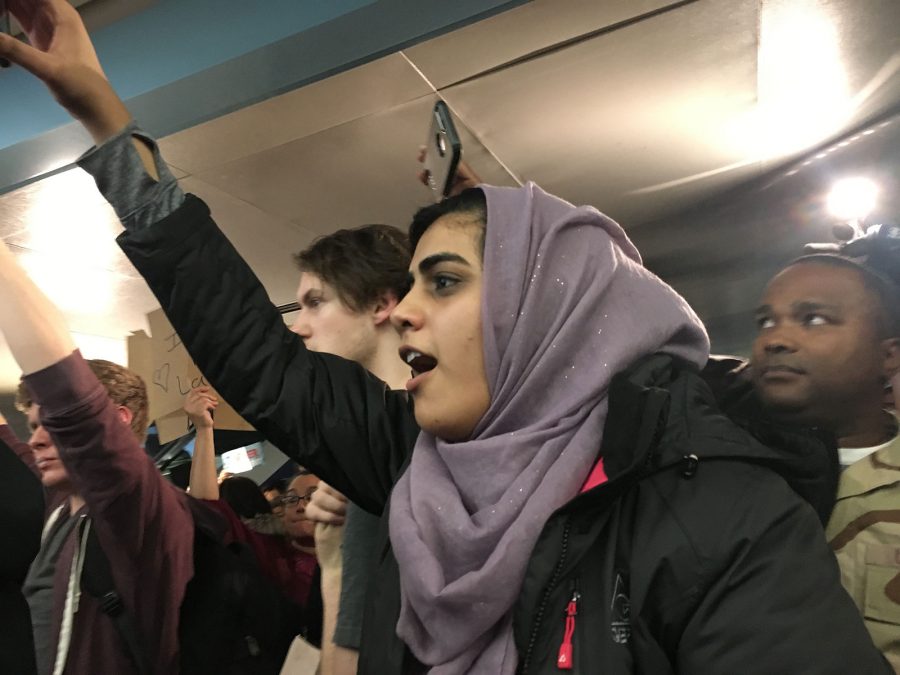Refugee order sparks outrage
February 1, 2017
CHICAGO—Late Saturday evening, a federal judge in New York dealt a massive blow to President Donald Trump’s executive order barring the entry into the U.S. from citizens of multiple predominantly Muslim countries for 90 days, while also banning of travel from Syrian citizens indefinitely.
The Judge issued a stay order freezing the deportation of detainees who possess proper legal status until Feb. 21, when another hearing is scheduled on the executive action. The order offered a sigh of relief to the numerous lawyers who flocked to airports across the nation to help defend those who were detained as part of Trump’s executive action.
But throughout the evening at Chicago’s O’Hare International Airport, people detained under Trump’s executive order were released periodically, despite the fact the order does not force those in detention to be immediately released.
“We have no idea [how The Trump Administration will respond to the release of detainees from the banned countries,]” said Kathleen Vannucci, a member of the American Immigration Lawyer Association. “It will be interesting to see what the directions are from Washington and what happens.”
Vannucci was one of the many lawyers who assembled at O’Hare to provide pro-bono legal defense for the detainees. Meanwhile, nearly 2,000 protesters also assembled at O’Hare to condemn the executive action.
People who landed in the U.S. from Sudan, Iran, Yemen, Libya, Somalia, Iraq and Syria were detained upon arrival to the United States under the president’s action, which didn’t discriminate against citizens who had citizenship from both the U.S. and the six nations the ban applied to.
The action also treated those who were permitted to live in the U.S. long-term the same as individuals who live permanently in the countries the ban applied to, which prompted much confusion about how to enforce the ban.
Oaklawn resident Abdulsalam Mused, 67, has lived in the U.S. as a green card holder for 18 years and hasn’t even returned to his native Yemen in 22 years. But on returning to the U.S. after attending a wedding in Saudi Arabia, Mused was held for 6 hours at O’Hare and said that this was the first time he felt like he was “considered as a terrorist” here in the U.S.
“I am fighting against the terrorist all my life,” Mused, who noted that he was here on political asylum, said. “I am here because I [am] scared from the terrorists in my country, and here they think I’m [a] terrorist.”
Mused boarded his flight after the executive order was signed, but presumed he was in the clear because he “thought he already was a resident,” his son translated.
The executive order—which claims that the U.S. should not “admit those who would not support the constitution, or those who would place violent ideologies over American law”—was an attempt to make good on Trump’s vow during the campaign to implement “extreme vetting” of Muslim refugees and to suspend Muslim immigration “until we figure out what is going on.”
But his vows, and his subsequent actions, were painted by critics as being “un-American” at a press conference outside O’Hare’s Terminal Five, the international terminal.
Marty Castro, immediate past Chair of the U.S. Commission of Civil Rights, derided Trump’s executive action at the press conference, accusing it of being the “most inhuman [action] of any president of the United States.”
“This morning, before I left D.C., I was at Arlington National Cemetery. And as I looked at those tombstones, they represented every creed and color of people. Americans from around the world who came to this country, or for whom this country moved its borders. There were crosses. There were stars of David. There were crescents. There was every form of religious beliefs in those hallowed grounds,” Castro said. “That is America, not the America Trump is trying to recreate.”
President Trump’s executive action on refugees came in a week where Trump signed many executive orders and memorandums signaling his intent to make-good on his word campaign promises, assuring supporters that he will not stray from his intentions.
While many of the critics of Trump have referred to the executive action as his ban on Muslims, Trump repeatedly rebutted their claims.
Trump—who remained largely quiet throughout the duration of the protest—posted on Twitter the next morning that “Our Country needs strong borders and extreme vetting, NOW” and hasn’t shown much signs of rescinding the executive order.
Monday morning, Trump went on Twitter to argue that “that all is going well with very few problems” as a result of the order. He went on to place the blame on other issues.
“Only 109 people out of 325,000 were detained and held for questioning. Big problems at Airports caused by Delta computer outage… protesters and the tears of Sen. [Minority Leader Chuck] Schumer.”
U.S. customs didn’t respond to multiple phone calls from The LION requesting an interview and multiple inquires about how they determined who to release. But according to ABC News, 81 waivers were granted because of special immigration status or legal residence in the U.S., citing an anonymous Senior Homeland Security official.
In Chicago, the cadre of lawyers assembled estimated that there were under 20 people who were detained, but the estimate kept shifting throughout the night. At around 10:21 p.m., the lawyers made a huge announcement: everyone detained at O’Hare as a result of the order had been released, sparking widespread celebration within the terminal.
The crowd largely dispersed afterwards.
On Sunday, however, protesters gathered yet again to try and further pressure Trump into rescinding the executive action.



















![Movie poster for '[Rec]" (2007).](https://www.lionnewspaper.com/wp-content/uploads/2023/04/rec-640x900.jpg)



